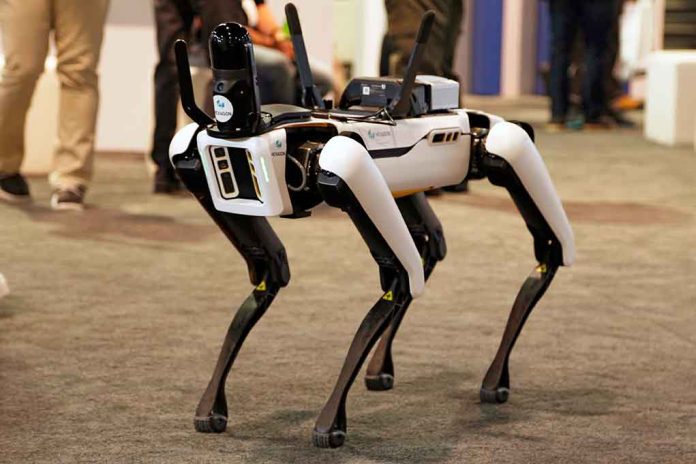
LAPD’s introduction of a robotic dog, “Spot,” has triggered debates over police militarization.
At a Glance
- The LAPD has introduced a 70-pound robot dog, “Spot,” from Boston Dynamics.
- Spot’s role includes navigation of difficult terrain and picking up objects.
- Concerns raised about Spot’s potential for police militarization in marginalized communities.
- LAPD assures Spot will not be weaponized and only used in high-risk situations.
- The robot was donated by the Los Angeles Police Foundation, valued at $280,000.
Introduction of Spot by LAPD
The Los Angeles Police Department has added a novel crime-fighting tool to its arsenal—a robotic dog named Spot, designed by Boston Dynamics. This technological marvel is similar in size and agility to a 70-pound golden retriever. Spot can autonomously navigate difficult terrains, a particularly useful feature when handling dangerous situations, such as armed standoffs or crime scenes requiring high precision.
Weighing 70 pounds, Spot can open doors, pick up and drag objects weighing up to 50 pounds, making it a significant asset in potentially life-threatening circumstances. Deputy Chief David Kowalski, from LAPD’s counterterrorism unit, highlighted Spot’s life-saving potential: “The main reason that we acquired Spot is to save lives.
Meet Spot, the LAPD's new crimefighting robot dog https://t.co/OThWlfVbMZ
— WGN TV News (@WGNNews) October 3, 2024
Concerns Over Militarization
Despite the LAPD’s assurances that Spot will not be armed or used for facial recognition, some communities view Spot’s deployment with suspicion. Critics argue that it symbolizes an escalating trend towards police militarization, particularly in marginalized neighborhoods. Councilmember Hugo Soto-Martínez and others have voiced concerns about the ethical implications and the potential for technology misuse.
“I think that people are concerned in our communities because Spot follows a long and flawed history of predictive policing in Los Angeles,” observed Brittany Friedman of USC’s Sociology Department.
Proponents argue that Spot could save lives by being deployed in high-risk scenarios such as barricades or situations involving explosives. The robot was donated to the LAPD by the Los Angeles Police Foundation, valued at nearly $280,000, with the expectation of being used responsibly within a limited scope.
Oversight and Future Use
The use of Spot is subject to oversight, with the LAPD mandated to provide quarterly reports detailing its deployment. The Los Angeles City Council approved the donation in an 8-4 vote but plans to monitor its application closely, preserving the option to adjust or suspend the program if necessary.
By setting these parameters, the LAPD aims to maintain public trust while leveraging innovative technologies to enhance safety measures. Nevertheless, the deployment of robotic police dogs continues to provoke discussions about privacy, ethics, and the evolving nature of law enforcement.





